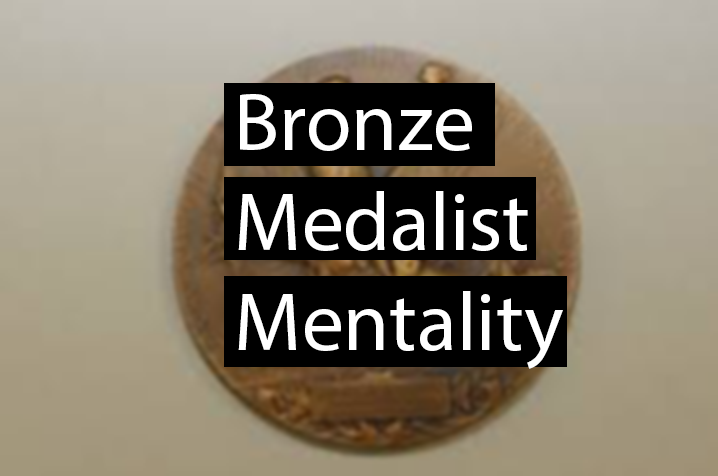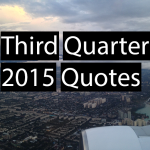Generating Enthusiasm and Embracing the Bronze Medalist Mentality
Genuinely realize that today is not guaranteed, that nothing is deserved so to speak. One must work and fight for everything. Earn it. To think otherwise is illusory.
If the world were strictly based on meritocracy, fairness, and magnitude of effort put forth then all of those in poverty who endeavor and toil assiduously and tirelessly would be assured a path to prosperity. And those who elected not to apply themselves would automatically be penalized. Many of us know from experience for this to not be true, that there are a number of factors at work in determining socio-economic standing (social mobility, intergenerational wealth transfer, education, timing, etc.). While economic globalization has doubtlessly lifted billions out of poverty, the effort-success causation is not an accurate portrayal of reality. In the same vein, guaranteed wealth and privilege is not and should not be a reality. Within this backdrop, it is instrumental to shape one’s thoughts and behavior to help ensure mental well-being in an array of circumstances and to provide additional inspiration to advance in life, irrespective of age, gender, nationality, social class, religion, ethnicity or any other society-imposed notional characteristic.
Research reveals that recession graduates are typically happier with their jobs than graduates obtaining their degrees in prosperous times. This happiness remains intact for decades since recession grads are more grateful for what they have as the difficulties and hardships they encountered early in their career positively influenced how they thought about and evaluated later work environments. The key word is grateful, the appreciation for what one has rather than what one could have or does not have.
This is akin to the mentality found in sport – the silver medalist (“booming market grad”) versus the bronze medalist (“recession grad”) – as research also demonstrates that the silver medalist agonizes over their performance and constantly obsesses over and questions the what-if scenario (i.e. “counterfactual comparison”) that could have resulted in a gold medal. On the other hand, the bronze medalist feels fortunate and finds fulfillment in finishing on the podium, as the alternative is a fourth place rank.
As written in the study on 1992 Barcelona Olympic athletes:
“Following a competition, silver medalists tend to focus more on what they failed to achieve than do bronze medalists. This asymmetry in counterfactual comparisons explains why bronze medalists tend to be happier than silver medalists. While bronze medalists can find contentment in thinking “at least I won a medal,” silver medalists are often confronted with an imagined outcome that almost occurred—a preferred outcome in which they are the winner and have the gold medal hanging around their neck. Imagining what might have been can lead those who do better to feel worse than those they outperform.
(…) Bronze medalists tend to be happier than silver medalists. The authors attribute these results to the fact that the most compelling counterfactual alternative for the silver medalist is winning the gold, whereas for the bronze medalist it is finishing without a medal.”
Indeed, “people can be happier with less, depending on how they think about what they have” — it is resolutely a question of perspective in thinking.
Shifting perspective is critical in our day-to-day well-being. The mantra that “life is 10% what happens, and 90% how you deal with it” does in fact hold psychological truths to it. This same phrase is embodied in the philosophy of the Dalai Lama in the book “The Art of Happiness” (essential reading):
“We also often add to our pain and suffering by being overly sensitive, over-reacting to minor things, and sometimes taking things too personally. We tend to take small things too seriously and blow them out of proportion, while at the same time we often remain indifferent to the really important things, those things which have profound effects on our lives and long-term consequences and implications. So I think to a large extent, whether you suffer depends on how you respond to a given situation.”
This ownership of suffering is termed “personalization of pain” by therapists, which is the phenomenon of erroneously believing that each annoyance or misfortune has been purposely perpetrated against us. This effectively serves to needlessly exacerbate our own suffering, to add insult to injury so to speak. In this same manner, there are times where we may seek to add some form of dynamism to our lives, some color or flavor during a bland day by dramatizing the past. On that subject of myopically recalling negative past events for immediate stimulation, the Dalai Lama states:
“Of course, sometimes this endless recounting of our woes can serve a limited purpose, it can add drama and a certain excitement to our lives or elicit attention and sympathy from others. But this seems like a poor trade-off for the unhappiness we continue to endure.”
It is precisely a poor trade-off. This is effectively creating an unsustainable form of “enthusiasm” in terms of happiness, and by extension, to one’s qualify of life. We reminisce how things may or could have been instead of understanding what we have and what we can change in the present and future.
Returning to the bronze medalist study as alluded to before:
“Counterfactual generation has functional value, and people tend to generate those counterfactuals that hold the greatest psychological value for them in a given situation” (Markman et al., 1993, p. 103). Downward comparisons (i.e., thinking about a worse outcome) are thought to provide comfort, whereas upward comparisons (i.e., thinking about a better outcome) are thought to improve future performance.”
As elucidated in the study, it is most assuredly vital to frame and strategically choose the most compelling counterfactual comparison to your own favor by internalizing and embracing the bronze medalist mentality of gratitude (downward comparison) as a baseline, complementary to upward comparisons for unwavering motivation to continually improve oneself. Take stock of what you have done, comparing the progress against yourself, and strive for excellence in the future in realizing goals within a realistic context. The realistic aspect is important for managing expectations in order to avoid being disappointed in setting metrics that are impossible to reach.
I am convinced that this bronze medalist mentality is integral in generating enthusiasm as it underpins a healthy optimism for what lies ahead. And rational enthusiasm has been shown in cognitive psychology studies (Positive Emotions Trigger Upward Spirals Toward Emotional Well-Being and The Role of Positive Emotions in Positive Psychology) to impart positive changes in emotions:
“Further meditational analyses showed that positive affect and broad-minded coping serially enhanced one another. These findings provide prospective evidence to support the prediction that positive emotions initiate upward spirals toward enhanced emotional well-being.”
“Positive emotions signal flourishing. But this is not the whole story: Positive emotions also produce flourishing. Moreover, they do so not simply within the present, pleasant moment but over the long term as well. The take-home message is that positive emotions are worth cultivating, not just as end states in themselves but also as a means to achieving psychological growth and improved well-being over time.”
They “can act as direct antidotes to negative states of mind” as said by Dalai Lama. Enthusiasm strengthens patience and tolerance, which are buffers against unpleasant emotions like that of hatred and anger, and help to improve the ability of withstanding trials, difficulties and hardships in life.
“In our day-to-day life experiences, tolerance and patience have great benefits. For instance, developing them will allow us to sustain and maintain our presence of mind. So if an individual possesses this capacity of tolerance and patience, then, even in spite of living in a very tense environment, which is very frantic and stressful, so long as the person has tolerance and patience, the person’s calmness and peace of mind will not be disturbed.”
This day-to-day granular level relevance is absolutely paramount and is hard to overstate. This may be counterintuitive as we often view life in the big picture (graduations, promotions, etc.), but in fact we live in one pixel – Today – at a time. Our reality is the here and now.
“So while thousands of Jack’s Todays will, to an outsider from far away, begin to look like a complete picture, Jack spends each moment of his actual reality in one unremarkable Today pixel or another. Jack’s error is brushing off his mundane Wednesday and focusing entirely on the big picture, when in fact the mundane Wednesday is the experience of his actual life.”
Thus, it would seem sensible to want to tangibly ameliorate the moments that comprise the experience, the pixels of today, that constitute our life, the complete picture. Otherwise said, to better guide the ship through stormy waters of stress and uncertainty.
Similarly, the effects of stress on the human body can vary significantly depending on one’s mental state and disposition toward its encounter. Blood vessels have been shown to not constrict as severely for those who see stress as an energizing and helpful force that allows one to accomplish the challenges that are presented ahead of them. Moreover, positively viewing stress coupled to empathy towards others has been scientifically proven to be healthy. The hormone oxytocin (often termed the “cuddle hormone”) released during acts of compassion, kindness, and intimacy aids in healing the negative consequences brought on by stress and helps to support resilience to future stress (anti-inflammatory, helps the body stay relaxed, and enables heart cells to regenerate and strengthen the heart). These benefits are augmented during social contact and social support — being surrounded by people and helping others does in fact biologically affect your body. Thus, viewing stress in a positive light — our mentality — can and very much does impact our human physiology, and in turn has veritable implications on our longevity and existence as a whole.
The bronze medalist mentality of gratitude, shifting perspective, generating enthusiasm, framing life’s timeline, and cultivating a healthy disposition towards the challenges of life altogether culminate into a material shift in one’s paradigm in viewing the world. Few things warrant such serious and honest consideration or are so salient to our daily lives.
I am by no means an expert on this subject, and I have much yet to learn (indeed life is a continual process of being less wrong everyday), but I have benefited noticeably from applying such principles to my own life. This is why I feel so obligated to share – to the point of inducing a stress response of my heart pounding as I put pen to paper on the subject. It’s how we experience life in each instant on a daily basis, this is very hard to exaggerate! It is painfully obvious that we all want to minimize our suffering and maximize our enjoyment in life, so I ask why not seek out those mechanisms? We live in an incredible age of technology and science that empowers us with a set of knowledge that was unbeknownst to the billions before us, and the human mind is only now starting to be discovered (not to mention the Universe, quantum physics, human DNA, etc.). This is remarkable! Yet we far often are too enveloped in the diversions that occur daily (I am very guilty of this).
For me personally, I generate enthusiasm by arranging my life around spending time with and making the concerted effort to remain in contact with those people I like – my friends and family -, to reasonably look after my health through exercise and setting goals for progress (and reflecting on past achievements), helping others when and where I can (enabling others where possible in their job/relationship search, donating, sharing worthwhile content to others, etc.), and engaging in activities that I enjoy (traveling, listening to music, reading, writing, meeting new people, learning languages, trying new things, etc.).
Fortitude in determination, humility in conducting oneself, and an honest desire for compassion for the goodwill in others. No matter one’s place in civilization, it is always possible to uphold such traits and share compassion with others as this is based on mental disposition as opposed to material possession. And this downward comparison, the bronze medalist mentality, builds a “moat” in one’s mind to maintain a calm and stable outlook in the conditions that we may confront in the course of our daily lives.
With that, it is time for a jog. I’ll go for bronze. 😀




